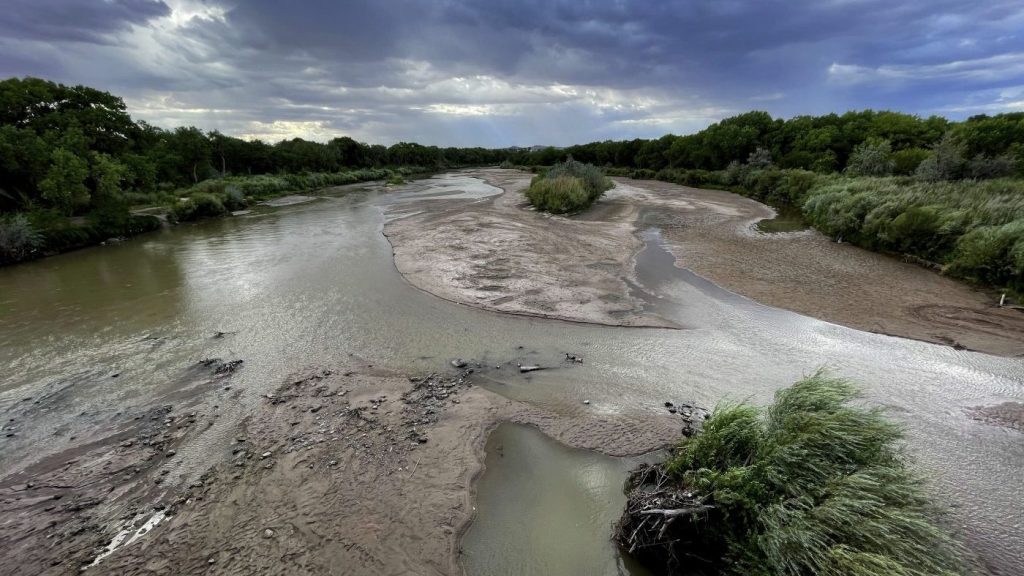Texas and New Mexico faced off with the U.S. government in the nation’s highest court on Wednesday in the latest chapter of a decade-long dispute over the way water from the dwindling Rio Grande river is divided.
The Supreme Court was hearing oral arguments as to whether a deal forged by those two states, as well as Colorado, could be approved without the input of the federal government.
While New Mexico and Texas have resolved past discrepancies over how the former delivers water to the latter, the U.S. maintains that their proposed agreement on the matter is both incompatible with a historic compact and would obligate the federal government to actions that it hasn’t had the chance to approve.
“States, by their mere consent, cannot impose on non-consenting parties their view of the law,” Frederick Liu, assistant to the solicitor general, said at the hearing. “Rather, that view of the law has to be litigated on the merits by the non-consenting party.”
The current case stems back to the historic Rio Grande Compact of 1938 — an agreement ratified in 1939 with the intent of overseeing river use in three U.S. states, through a flexible system of debits and credits that accounted for shifting hydrological conditions. Historically, New Mexico has received 57 percent of the domestic Rio Grande flow, while 43 percent has gone to Texas.
The Rio Grande River flows for 1,896 miles from its San Juan Mountains headwaters in southwestern Colorado through New Mexico and Texas — ultimately forming the U.S. border with Mexico, with which the U.S. first signed a separate water-sharing agreement in 1906. In addition to the federal and state parties, the river serves 20 tribal nations in New Mexico and two in Texas.
But the initial apportionments were designated far before groundwater pumping began to surge in the 1950s, at which time water flow to Texas began to diminish, Andrew Mergen, a visiting assistant clinical professor at Harvard Law School, noted in a recent analysis of the case.
“The baseline from when this compact was enacted in 1939 has undoubtedly changed, but we’re locked in,” Mergen said.
The dispute being litigated in the Supreme Court is a decade in the making, beginning with Texas’s 2014 decision to sue New Mexico for excessive pumping that allegedly robbed the Lone Star State of some of its share. In doing so, Texas argued at the time, New Mexico was violating the Rio Grande Compact.
The U.S. joined the fray later that same year, submitting a complaint contending that New Mexico’s violations were harmful to the country. But this step raised concerns as to whether the federal government had the right to weigh in on an interstate compact matter.
The Supreme Court in November 2014 then appointed a Special Master — at the time, A. Gregory Grimsal of New Orleans — to provide input on the issue. After the high court in October 2017 agreed to hear the case, the justices ruled in 2018 that the federal government could intervene.
An ensuing trial began in 2021 — split into two halves, with an initial virtual portion occurring that fall. The second part was postponed, as the states engaged in negotiations. In November 2022, they agreed to a consent decree that they said “compromises and settles all claims among them arising from the Rio Grande Compact.”
Under the proposed decree, New Mexico’s water deliveries to Texas would also be measured at the border-adjacent El Paso Gage — replacing historical measurements that have taken place about 100 miles upstream at the Elephant Butte Reservoir.
This methodology, according to the parties, would adhere to a “state line delivery requirement,” which they described as “analogous to the delivery mechanism that measures Colorado’s compliance” in its deliveries to New Mexico.
The decree also delineated protocols to preserve “the equitable apportionment of Rio Grande water,” including accelerated delivery compensations in the case of an under-supply scenario. The states agreed “to forgo damages for past actions” and focus on future supply attainment.
The parties moved for the Special Master to recommend that the Supreme Court approve their consent decree, which was ultimately unsealed by the court in January 2023.
The states argued that the decree is “a fair and lasting solution to a complex and longstanding dispute over the division of Rio Grande water.”
“No one disputes that the Rio Grande Compact divides the river’s waters, 57 percent to New Mexico and 43 percent to Texas,” Lanora Pettit, Texas’s principal deputy solicitor general, said at the Wednesday hearing. “But neither the compact nor the downstream contracts specified percent of what.”
The federal argument that the consent decree violates the Rio Grande Compact “ignores that this Court has encouraged states to clarify technical issues,” including the question of baseline water availability, according to Pettit.
“The only issue resolved by the consent decree is the equitable apportionment,” Jeffrey Wechsler, special assistant to the New Mexico Attorney General, said at the hearing. “The United States interests are not implicated.”
Immediately after the submission of the consent decree, the U.S. filed a memorandum in opposition. The document stressed that although the federal government did not provide consent, the decree “nonetheless imposes obligations on the United States.”
“The U.S.’s position is, if we’re going to be bound by this consent decree, if we’re going to be bound by the settlement, it should not go forward without our consent,” Mergen, the Harvard clinical law professor, said in the Harvard Law Today explainer.
Part of the government’s stance, he noted, is rooted in the notion that the decree is inconsistent with the original compact, as it would change some of the original metrics. The U.S. is also concerned about potential impacts to its obligations to Mexico, as well as to its management — via the Bureau of Reclamation — of water deliveries to irrigators east of the river, Mergen added.
At the Wednesday hearing, Liu expressed concern that “the long-term viability of the project itself is at risk,” stressing that the Bureau of Reclamation in 1902 struck “a basic bargain” with irrigation districts, in which the U.S. pledged to build necessary dams and reservoirs to fulfill their needs.
Warning that the consent decree would “undermine that bargain,” Liu explained that New Mexico’s irrigation districts would shoulder the burden if over-pumping lands the state in water debt.
“If groundwater pumping remains the same or it goes up, what New Mexico can choose to do is to force the United States to transfer water from the district to Texas,” Liu warned.
Despite the federal government’s objections, the Special Master — now U.S. 8th Circuit Judge Special Master Michael J. Melloy — in July 2023 recommended that the Supreme Court approve the consent decree. He described the decree as both fair and reasonable, while noting that it “permissibly interprets ambiguities,” by clarifying downstream apportionments.
Melloy also stressed that while the court had allowed the U.S. to intervene and assert claims against New Mexico in the past, the federal government should not be able to force the states “to continue litigating this original jurisdiction action against their jointly and clearly expressed wishes.”
But the U.S. in October 2023 filed a brief that took exception to the Special Master’s recommendation. By mid-January, the Supreme Court set that exception for oral argument in due course, and by the end of the month, set the date for that argument as March 20.
Countering the state-level argument that U.S. responsibilities in the basin are unrelated to the consent decree, Liu maintained that the federal irrigation project “is intertwined with the compact.”
“We have been here all along, protecting the project’s delivery of water to the districts and Mexico — that delivery of water is the compact apportionment,” Liu said.
Nonetheless, Justice Neil Gorsuch pointed out that if the court was to rule in favor of the federal government’s exception, such a decision could set a far-reaching precedent.
“You’re asking us to say that two states cannot resolve their disagreement in this court, consistent with the compact, so long as the United States objects,” Gorsuch said. “That’s the upshot.”
Texas and New Mexico are in a dispute with the US government in the Supreme Court over how to divide the water from the Rio Grande river

Keep Reading
Add A Comment
Keep updated
Get the latest creative news from FooBar about art, design and business.
Copyright © 2025 The Plaza Journal. All rights reserved.








